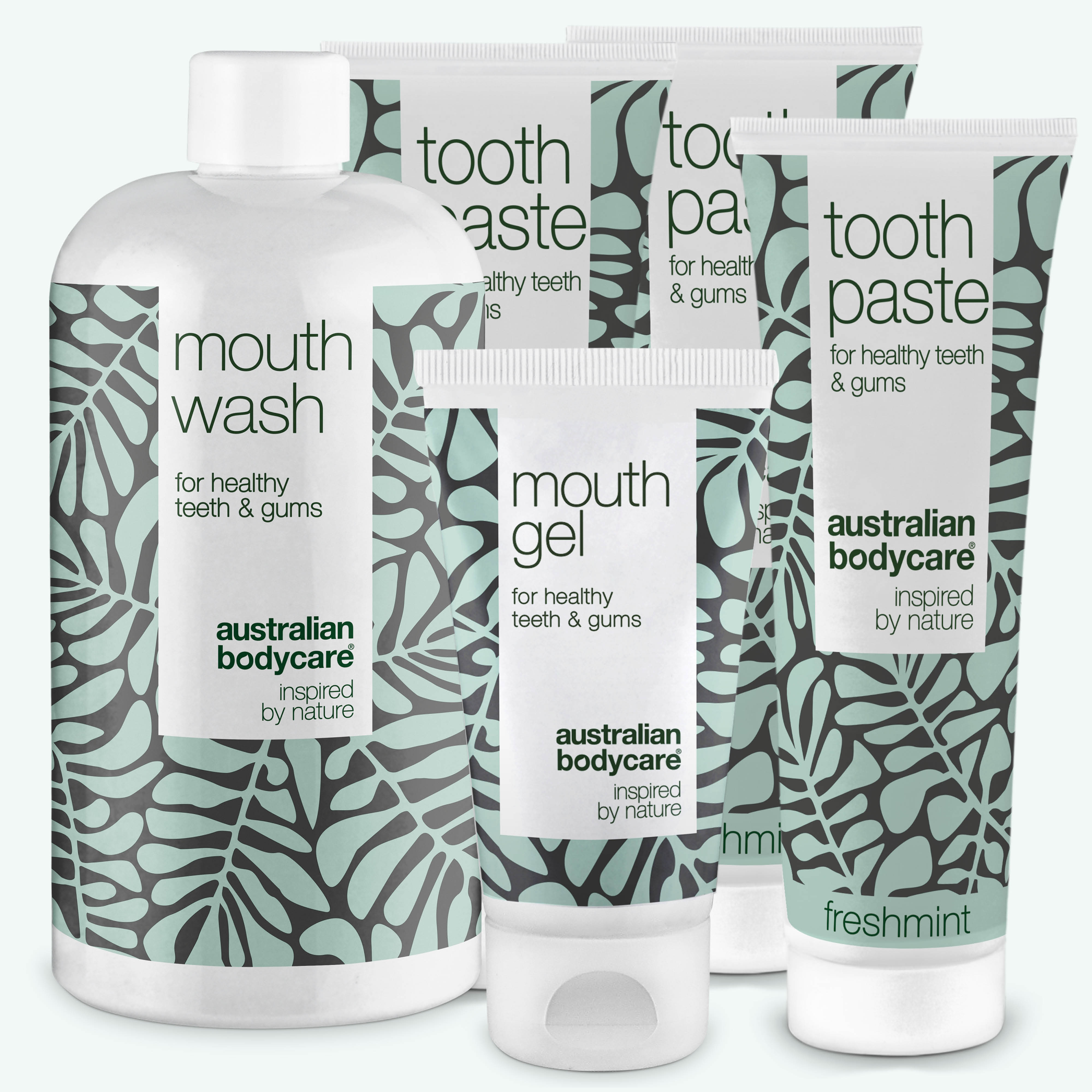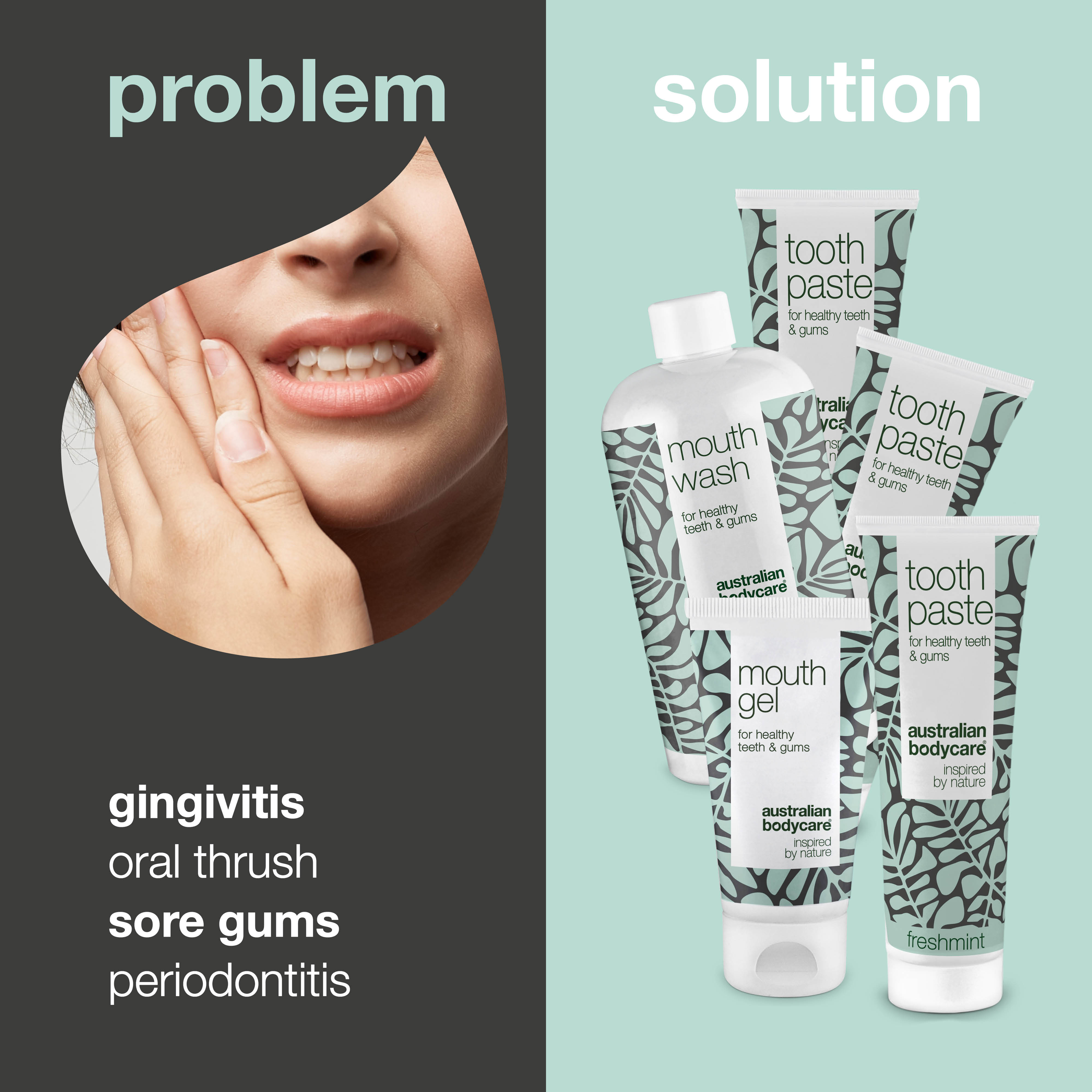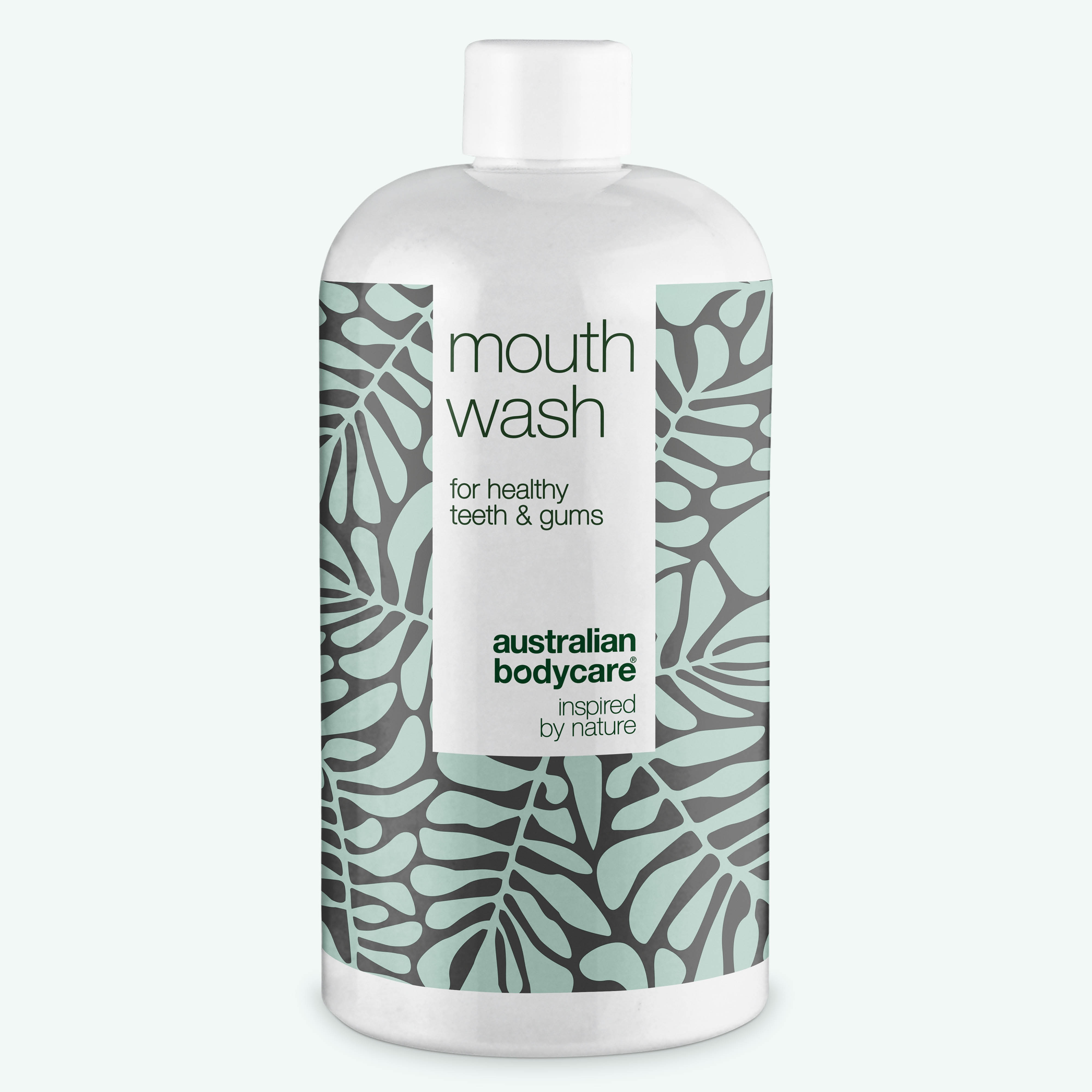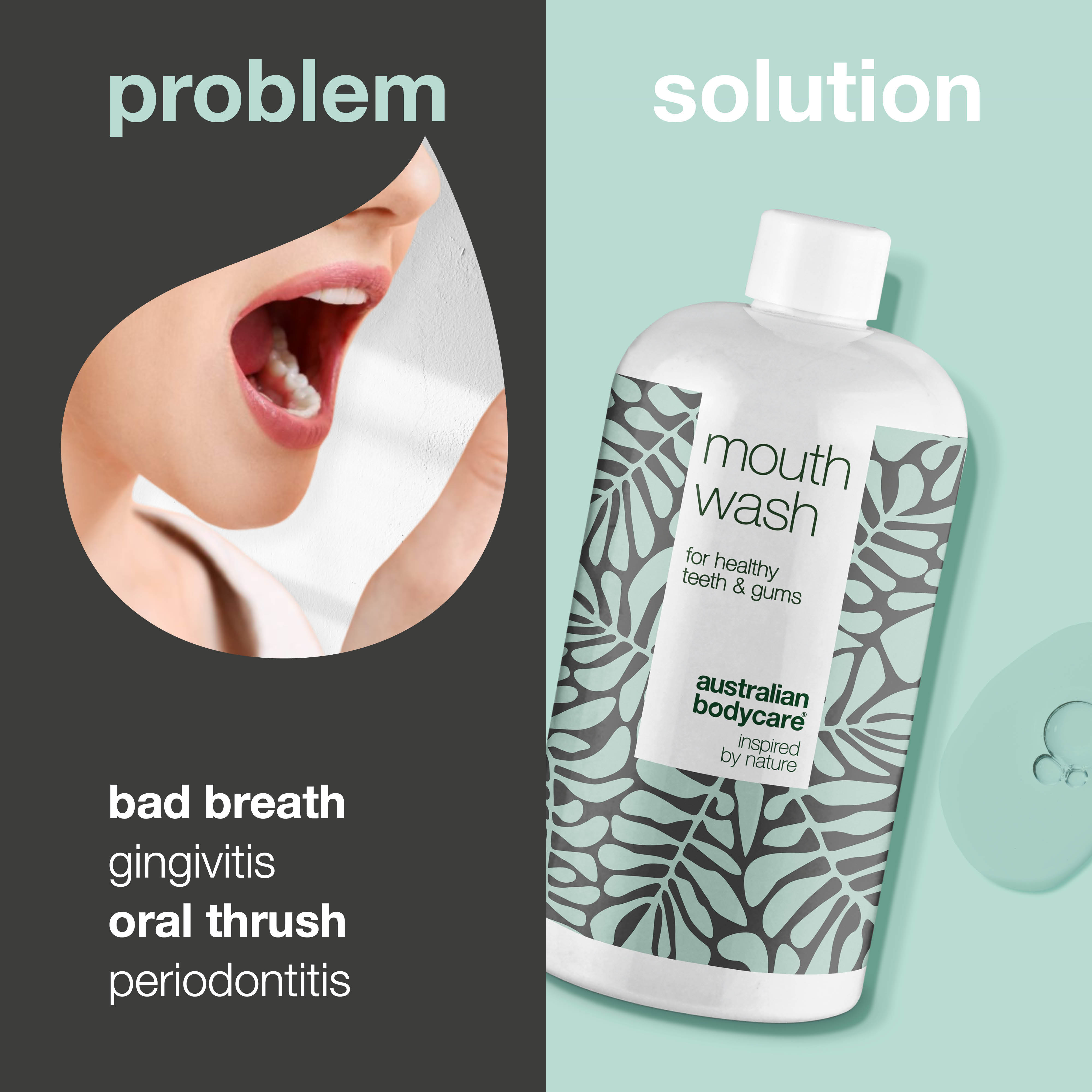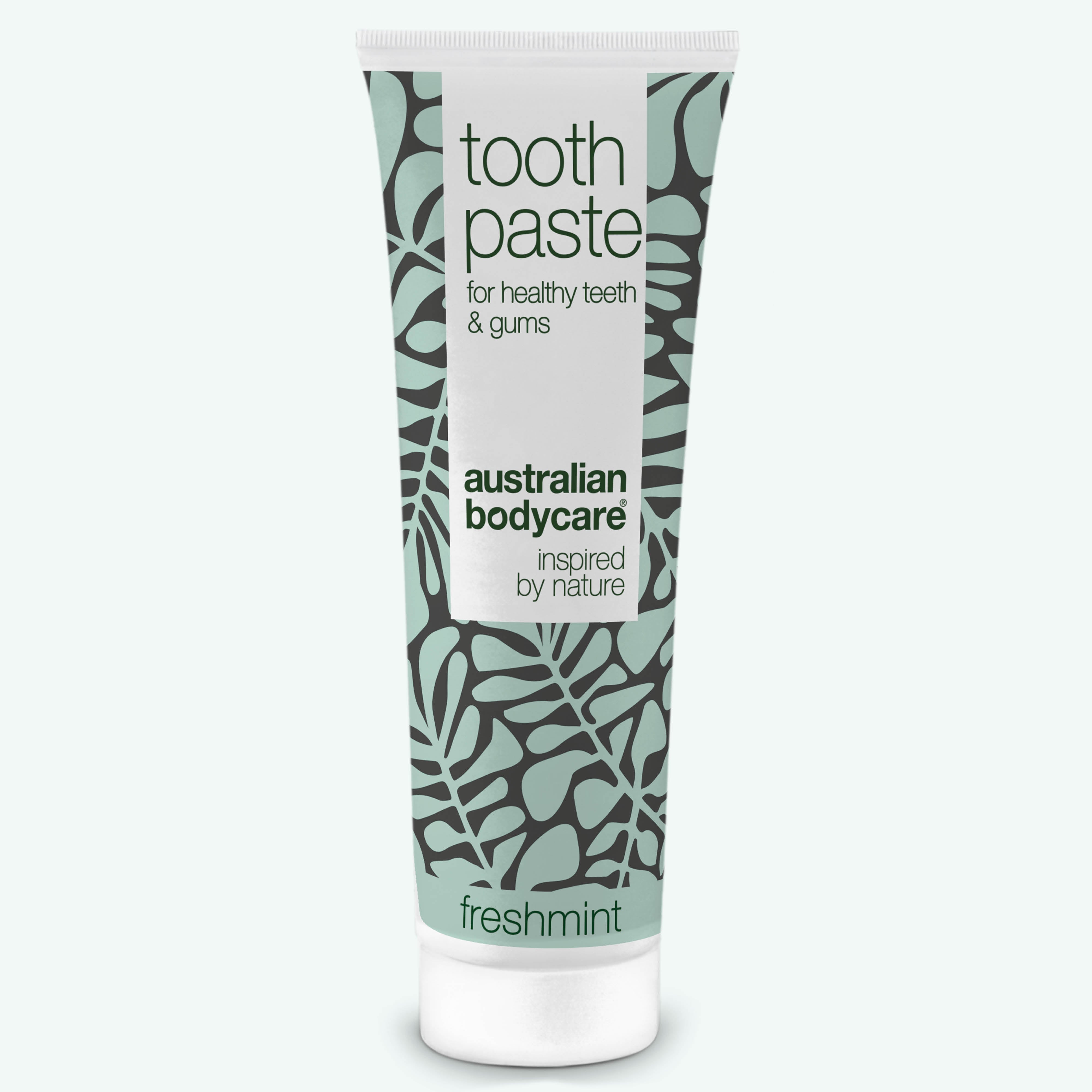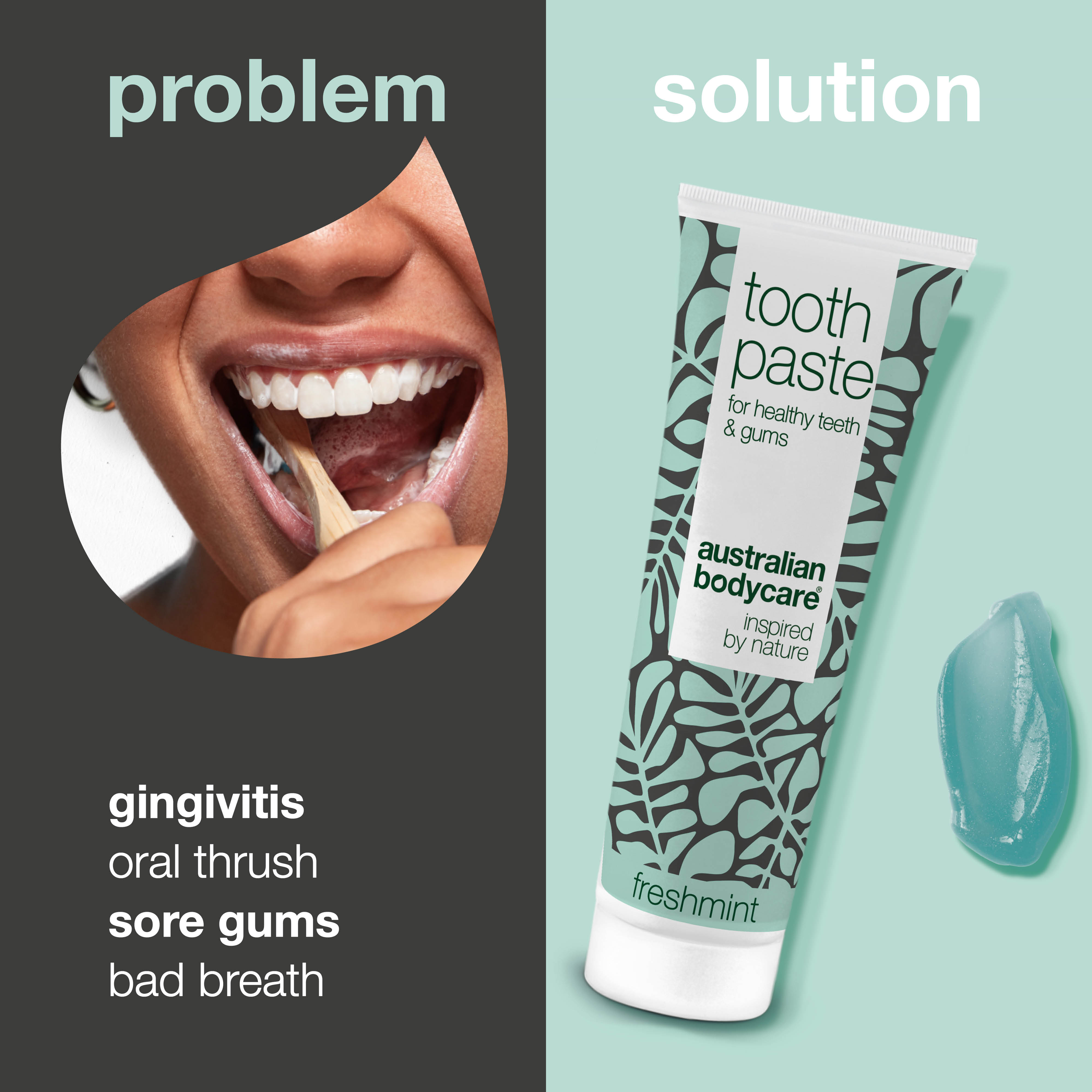Gingivitis: Get rid of it and keep your mouth healthy
Gingivitis can be painful. Fortunately, with good toothpaste and a mouthwash with Tea Tree Oil, you can prevent inflammation in your mouth. Read how you can get rid of gum disease.
Table of contents
How can gingivitis be treated?
Inflamed gums can cause a lot of trouble, and you should take it seriously, if it happens to you. There are various forms of gum disease, so there is no single definitive answer to how it is treated. Some cases can be cleared up in a few simple steps, while others call for more help.
We have some suggestions for how you can get your mouth healthy, and how you can relieve irritated or inflamed gums.
What can you do yourself to prevent or stop gingivitis developing?
The be-all and end-all is good oral hygiene. Your teeth should serve you all your life, and if you give them a little love and care every day, they will stay healthy. Basically, good oral hygiene consists of three simple steps:
- Clean your teeth morning and evening. Use our toothpaste with Tea Tree Oil, which has properties that are good for your mouth.
- Remember to floss. Remnants of food tend to stick between your teeth, where your toothbrush cannot reach.Catch the tiny food remnants with dental floss, and prevent infected gums.
- Finish off with a mouthwash. Our mouthwash with Tea Tree Oilis ideal. With a mouthwash, you prevent bad breath at the same time.
Go through these three steps to remove plaque and prevent gingivitis before it progresses to periodontal disease.
An introduction to Tea Tree Oil
Tea tree oil is an essential oil obtained from an Australian tree, Melaleuca alternifolia. It is not known how long people have benefited from its antibacterial properties, but it is likely that Aboriginal Australians used the healing leaves of the tree to treat a variety of skin conditions.
Today, the essential oil is extracted and used for many different purposes: Precisely because Tea Tree Oil has anti-inflammatory properties.
Your toothbrush is your best friend when you want good oral hygiene. Our products with Tea Tree Oil equip your toothbrush even better. Our toothpaste is formulated specially to prevent gum disease and periodontal disease.
Medical treatment
If you only have irritated gums, the chances are that with extra focus on oral hygiene, the irritation will clear up. However, in the great majority of cases, you will need dental treatment if you have gingivitis.
Both hard and soft deposits must be removed from the teeth, and a dentist can carry out a thorough scaling that will make your mouth clean and fit for fight again. Then it is up to you to continue the daily battle and keep bacteria away.
The dentist can assess the condition of your gums and decide what needs to be done. The gingival pockets may be so deep that surgery is necessary. A local anaesthetic can keep you comfortable while the pockets are cleaned. Then you can be sure there are no more harmful bacteria.
Keep gingivitis away
Now the dentist has done what he or she can to get rid of gingivitis, so that your mouth can be healthy again. Your mouth is healthy when your teeth are smooth and the gums are firm and pale pink. Go through the three oral hygiene steps both morning and evening. Do not press too hard with the toothbrush, as it can irritate the gums unnecessarily.
If you are conscientious about your morning and evening hygiene routines, you will rarely see any sign of inflammation.
What is gingivitis?
Right from a very young age, we learn that we must clean our teeth, or we will get germs and holes or caries in them. But what exactly is caries, and what does it do in our mouths? Whatever children imagine about holes in teeth or the tooth fairy, the existence of bacteria is indisputable.
If bacteria are allowed to feast in our mouths, there is a risk that sooner or later, there will be gingivitis or caries. This applies to both young and old.
Our teeth are surrounded by tissues that hold them in place. For several reasons, the tissue can become inflamed, but if only the gums are inflamed, and not the tissue that supports the teeth, then it is called gum disease or gingivitis.
It is vital that you take action if you suspect you have gingivitis. If this inflammation is not discovered, it can continue to develop and spread to the tissue that supports the teeth. Then the gingival pockets can become deep, and the bone can break down. This condition is no longer called gingivitis, but periodontal disease.
Fortunately, you can see gingivitis yourself and do something about it before it progresses.
Gingivitis is not dangerous by itself, but it is important to treat it as soon as you discover it.
Keep a lookout for the symptoms.
What are the symptoms of gingivitis?
There are a few things you can watch if you suspect inflamed gums, even though the symptoms at the early stages are very slight. The early symptoms will be:
If you have either of these two symptoms, you should give your gums the care they need. If one or several of your teeth are loose, it may be a sign of periodontal disease, and then you must get professional help from your dentist.
Why do people get gingivitis?
There can be several reasons why you get gingivitis, but the most common cause is of a bacterial nature: when bacteria are allowed to settle as deposits on the surface of the teeth. These deposits are called plaque, and if they are not removed, the infection can spread from the surface of the teeth to the gums.
Factors that particularly cause plaque and thus increase the risk of gum disease are:
- Poor oral hygiene
- Smoking
- Meals containing sugar
Fortunately you can do a lot with our Tea Tree Oil toothpaste and mouthwash, which give you a good basic oral hygiene.
How long does gingivitis last?
As soon as you have irritated gums and suspect gingivitis, you should take action. The duration of gingivitis varies, depending on how fast you react to it.
You can help to stop the development of gingivitis yourself, and we will come back to that later. However, you may have scale (calcified plaque) on your teeth, and you need a dentist to remove it for you. If your gums are very tender, we recommend that you visit your dentist, who will soon be able to shorten the duration of gingivitis.
If you react quickly to sore gums and possibly bleeding, the symptoms can disappear again after just a few days. Once you are free of gingivitis, you must continue to maintain the good oral hygiene.


